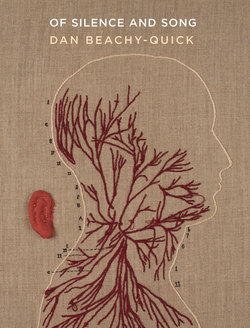Читать книгу Of Silence and Song - Dan Beachy-Quick - Страница 12
На сайте Литреса книга снята с продажи.
Оглавление2.
I had thought for years how best to begin.
Maybe just a blank page.
Some way of showing the precedent silence. But then I doubted so simple a gesture could make it felt: that silence. I worried the gesture would seem obvious. But then I remembered what’s most obvious is what I’m most interested in.
What the obvious hides in itself. Not as a secret. Like a breath being held.
Like a child believes in the dark and so doubts God, but every morning reverses the conclusions. Like doubt or faith when they begin in us by acting like one another. Only later do they act opposed.
The trouble is not that what is pure is complicated past our understanding. What’s quiet is just too simple to be understood. One method might be to liken that silence to the inner life once you learn to accept that the “inner life” is just another myth.
Socrates asks: Can a man know and also not know what he knows.
Know thyself. The imperative acts so simple, but then you try to follow the command for your whole life, as one might follow an echo back to a source, but the source is just a cave, and the shadows living there are quiet. And all along you thought you’d find yourself there. That you lived there. That you’d come home, source somehow of yourself. But it isn’t true.
In Greek, ἀληθείᾳ, the word for truth, might best be translated: “that which makes itself obvious.” There are other best ways to define it.
“The stone the builders cast out has become the cornerstone.” In Psalm 118:22 I found a comfort and a clue. I’d like to say that I repeated this verse to myself ceaselessly, but that would be a lie. I didn’t even know it mattered to me until I happened upon the words as a child happens upon a forgotten toy and remembers suddenly the life that had been in it. Mostly this experience happens to children when they become adults. I just found the words in the box. But the box was my head.
I needed to find the cast-out stone. That’s how to begin. I thought of the names of my daughters: Iris. Hana. Before they were born, before I had any inkling of their existence, they each were such a stone. But not now. Too many years have passed. My love for them isn’t silent. They do not fill me with silence. And what is silent in them is theirs alone. A rock cast away from me. Something I can’t pick up.
I thought of my wife, Kristy. But her silence is the prism that breaks white light into the rainbow.
I thought of a dream I had after I fell in love with Kristy and decided I must become a poet. In the dream I wandered down a dark road through a kept field. The grass all mown. I thought it was a cemetery but there weren’t any stones. A tree by a bend in the pitch-black asphalt, so black I knew it had been raining. That’s when I saw the rainbow. It kept still in the sky as I neared it. The closer I got the more intensely I could see the colors, and in the spectrum I saw lightning flashing like a sensation between synapses. So I imagined it. Going closer I could see the rainbow had no breadth, no depth; it was thinner than a razor. That’s when I saw the letter floating in the colors. Just one letter. It flashed, made of electricity. “It is the letter aleph,” I thought to myself. Then the lightning in the letter struck my hand and the pain woke me up. It wasn’t until years later, when I finally began to study Hebrew, that I realized I’d recognized the letter before I could have known it.
I gave Hebrew up. It took too much time away from writing poetry.
Fifteen years passed.
Now I’m studying ancient Greek. Every hour I spend in declensions and conjugations deepens my sense of my own ignorance. It’s a kind of revelation, I guess. I’m not the student I thought I was.
To mark silence ( ) or * seemed like options for a while.
But the open-close parentheses began to seem like hands closing in prayer, or like hands circling a mouth that is unseen but open and about to yell out.
The asterisk—despite being that mark in Proto-Indo-European linguistics that marks the existence of an ur-word whose primary meaning undergirds and supports every iteration through time of every related word but whose proof etched in mud or in wax or on papyrus has never once been found—just felt like a notation that meant either to look up at the night sky at the grand silence of the stars, or to look at the bottom of the page for a note to help explain what might have been unclear in the text above. Usually, an allusion.
But what I want to point to isn’t in any direction because it’s in every direction.
Ubiquitous. Obvious.
Unavailable by the means at hand.
All.
